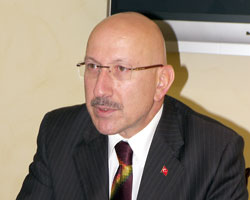
Turkish Almanac Promotes Security Sector Reform
Publication: Eurasia Daily Monitor Volume: 6 Issue: 137
By:

As the Turkish government has refocused on civilianization prompting tension with the country’s politically powerful armed forces, a liberal think tank launched its second almanac recently, drawing a bleak picture of the country’s controversial security sector before further democratization in this European Union candidate country.
"This almanac stands as a critical information pool compiled on the military and police," said Ali Bayramoglu, the co-editor of the almanac who is also a columnist for a Turkish daily, during the launch on July 8 of the book, "Almanac Turkey 2006-2008, Security Sector and Democratic Oversight" (www.bianet.org, July 8). Professor Ahmet Insel of the Istanbul-based Galatasaray University, co-editor of the almanac, noted that the national security concept has encircled Turkish society (Star daily, July 9).
The almanac was published by the Istanbul-based Turkish Economic and Social Studies Foundation (TESEV), with a partial financial contribution made by the E.U. The publication of the second almanac came in the midst of heightened tension between the ruling Justice and Development Party (AKP), and the Turkish Armed Forces (TSK), when the former initiated an amendment to the Code on Criminal Procedure (CMK), which was approved by the Turkish parliament after a late night debate on June 25.
The bill paved the way for the trial of military personnel in civil courts, marking an important step towards curbing military power in politics, and in meeting one of the critical criterion set by the E.U. The amendment allows the civil courts to prosecute military personnel in peace time for anti-government activities, threats to national security, constitutional violations and organized crime. The law also transfers the power to prosecute civilians in peace time for offenses currently under the military penal code. Ironically, the main opposition Republican People’s Party (CHP), took the bill to the constitutional court in an effort to have it annulled, after it was approved by President Abdullah Gul last week.
The first book came out in May 2006, the "Almanac Turkey 2005, Security Sector and Democratic Oversight," edited by Professor Umit Cizre of the Ankara-based Bilkent university. It was severely criticized in October 2006 by the then Turkish Chief of the General Staff retired General Yasar Buyukanit. He blamed the authors of the almanac of undermining the TSK during his live televised speech (All dailies, October 2, 2006).
The first almanac was jointly published by Tesev and Geneva Center for the Democratic Control of Armed Forces (DCAF). It covered several topics, including the state of the TSK and other security organisations such as the police, as well as the judiciary, and the National Security Council (NSC). The NSC has turned into an advisory board from its previously more assertive role of being the sole decision maker on Turkish internal and external threat perceptions following a 2004 reform, while the civilian membership of the board has been increased.
The second almanac widened its coverage to include issues such as the Turkish role within NATO, as well as the controversial military affiliated Army Mutual Trust Fund (OYAK). OYAK was first established in January 1961, almost one year after the country’s first military coup, to generate additional income for its underpaid officers from all ranks. It later turned into a big business empire, having stakes in approximately 26 companies in automotive, cement, finance, food, chemical, and service sectors.
Moreover, the second almanac, while focussing on the security actors in Turkey, also examines external factors affecting those actors. Its authors have also more than doubled from 10 to 26, highlighting the increased interest in the further democratization of Turkey.
Ali Bayramoglu, the co-editor of the second almanac and a social scientist with expertise on civil-military relations, said that the TSK has been moving back to its barracks, indicating that its influence over politics has been reduced (Taraf, July 13). According to him, Turkey’s main civil-military issue is the TSK’s involvement in internal security. "The TSK enters into internal security via the gendarmerie [paramilitary forces] and creates huge control and power over civilian life…Thus the gendarmerie’s human rights violations also through the Gendarmerie Intelligence and Counterterrorism Center (JITEM) has fallen under the military’s protection shield… However, things have changed… There is a passive and defensive policy at work in the military headquarters. The military has been struggling to protect its own living space," he argued (Taraf, July 13). JITEM is a wing of the Turkish Gendarmerie active in the conflict with the country’s outlawed Kurdistan Workers Party (PKK). Though its existence is denied officially, there has been several court cases opened against JITEM’s activities.
Meanwhile, the new almanac also touches on the unchanged status of the Security Law and Order Solidarity (EMASYA) protocol. The E.U.’s Turkey Progress Report, released on November 5 last year, stated that the 1997 EMASYA secret protocol on security, public order, and assistance units remains in force. The protocol allows military operations to be carried out for internal security matters, under certain conditions, without a request from the civil authorities. The almanac, examining the non-transparent status of the Turkish defense budget, highlighted that little progress has been made on strengthening parliamentary oversight of the military budget and expenditure: "…extra-budgetary funds are excluded from parliamentary scrutiny. The Defense Industry Support Fund (SSDF), from which most procurement projects are funded, is still an extra-budgetary fund," the E.U. report explained.
Turkish almanacs have the primary task of raising public awareness over the serious civil-military challenges surrounding the Turkish security sector. Its co-editors said in their introduction, that it is vitally important for citizens to examine the security sector with the aim of promoting democratization. "In order to make such an examination more than just an empty exercise, it must be informed by objective data. Therefore, studies like the almanac are an indispensable part of examining, debating and researching alternatives to the policies that public and private security actors impose on society, the instruments related to these policies and the solutions that these policies are aimed at," they noted.




